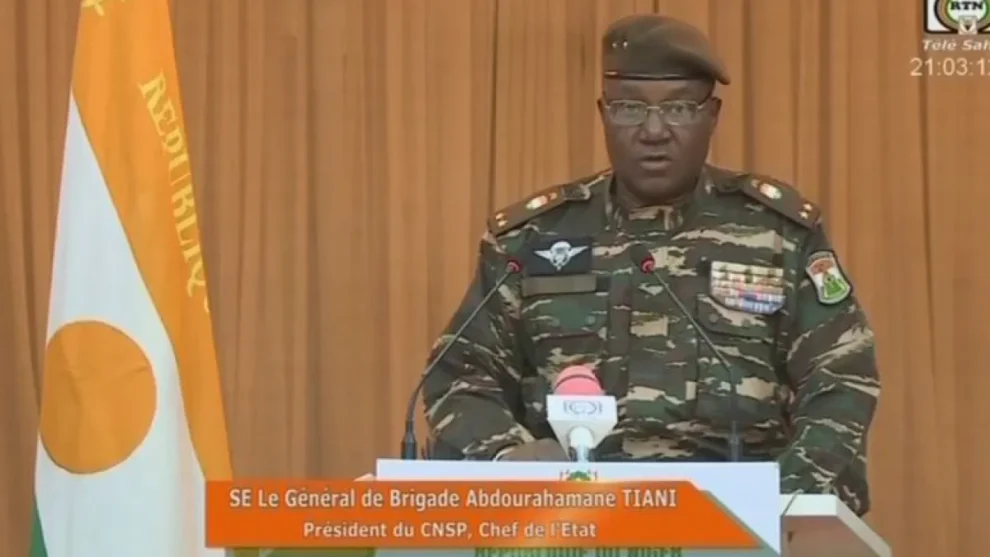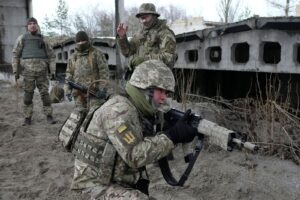Niger’s coup leader has proposed a three-year transition of power after meeting a delegation of West African leaders, warning that any attack on the country is “not a walk in the park” for those involved.
General Abdurrahman Chiani, speaking on state television late on Saturday, gave no details of the planned power transition, saying only that the principles of the move would be decided in a 30-day dialogue hosted by the ruling military council .
“Neither CNDD nor the people of Niger want war and keep dialogue open,” he said after meeting ECOWAS representatives for the first time in Niger’s capital.
“But let’s be clear: If there were an attack on us, it wouldn’t be the walk in the park that some people think it is,” he said.
After the July 26 coup, ECOWAS imposed severe sanctions on Niger and ordered the deployment of “reserve forces” to restore constitutional rule in the country. On Friday, the bloc said it had agreed an undisclosed “D-Day” for a possible military intervention and that 11 of its 15 member states had agreed to send troops to the operation.
In a 12-minute speech, Chiani claimed that ECOWAS was “ready to form an occupation force in cooperation with foreign forces to attack Niger” and denounced “illegal” and “inhumane” sanctions imposed by the regional bloc.
He added, “Let me reiterate that our goal is not to confiscate power. Let me reiterate that we are open to any dialogue that takes the direction that the proud and resilient people of Niger want.”

ECOWAS has taken a tougher stance on the July 26 coup in Niger than it had previously done in Mali, Burkina Faso and Guinea, the region’s seventh in three years.
Despite threats of military intervention, the group is also pursuing diplomatic avenues to reverse the power grab in Niger. The country is of strategic importance to regional and global powers because of its uranium and oil reserves, and its role as a hub for foreign forces involved in the fight against armed groups linked to Al Qaeda and the Islamic State (ISIS).
ECOWAS meets with Bazoum
While Niger’s coup leader had rejected previous visits, a delegation headed by Nigeria’s former head of state General Abdelsalami Abubakar was met by the military-appointed prime minister on Saturday, Reuters reported. .
After meeting Chiani, the group also met separately with the ousted president Mohammad Bazum, who has been under house arrest in Niamey since the military takeover.
Abu Bakar said, “We met Bazum, we heard from him what happened to him. He told us about the problems he faced. We will bring these problems to the leaders who sent us here. Nothing. There is no doubt that this meeting has opened discussions aimed at finding a solution to this crisis.”
The ECOWAS delegation arrived in Niamey after the new US ambassador to Niger, Katherine Fitzgibbon, arrived in Niamey.
A State Department spokesman said the new envoy’s “diplomatic focus will be to advocate for diplomatic solutions that preserve constitutional order” and immediately release Bazum, his family and all those illegally detained
The United Nations also joined the reconciliation effort, sending Leonardo Santos Simão, the Special Representative for West Africa and the Sahel, to Niamey to push for a swift and peaceful resolution to the Niger crisis.

Meanwhile, many residents on the streets of Niamey on Saturday said they were preparing to fight back against ECOWAS’ military intervention.
Thousands lined up outside the main stadium to register as fighters and volunteers to help meet other needs when the military needs support. Some said they had been waiting since 3 a.m. while a group of young people chanted support for the military rulers and against ECOWAS and the country’s former colonial ruler, France.
“I’m here to recruit to be a good soldier. We’re all here for that. We’re all going to do it if we can,” said Ismail Hassan, a resident waiting in line to register.
Event organizer Amsarou Bako claimed that while the military was aware of the move, it was not involved in recruiting volunteers to defend the coup. Hours after the event, organizers said the recruiting event would be delayed, without explaining why.
“Dissonance in the ranks”
And analysts say the military has failed to take full control of the country despite a clear show of support for the coup leaders.
Bisa Williams, a former U.S. ambassador to Niger, said, “This junta is using every tactic it’s ever heard to see if it works. They claim freedom of choice, but they suppress In addition to all the protests in support of Bazum, it is my understanding that there have been demonstrations or attempted demonstrations across the country.”
She told Al Jazeera, “I’ve heard a lot of reports of discord within the military and you’re seeing a lot of vulnerability in Niger now because so many armed forces have been moved to the outskirts of Niamey and away from the rest of the country. , keeping those areas open.”
“So, there was disorientation, there was confusion, and I knew there was a lot of dissonance in the ranks.”

Before the coup, the West viewed Niger as one of the last democracies that could cooperate to defeat al-Qaeda and the Islamic State in the Sahel and poured millions of dollars in military aid to support Niger’s military.
But political turmoil in Niger has bolstered the groups, and former militants told The Associated Press they have been taking advantage of the freedom of movement they have gained from the suspension of military operations by French and American troops, as well as worried Nigerien troops.
Last week, an ambush by militants killed at least 17 soldiers and wounded 20 others. It was the first major attack on Niger’s army in six months. At least 50 civilians in the Tillaberry area were killed by militants believed to be members of the Islamic State group, the Associated Press reported, citing internal security reports from aid groups.
“While Niger’s leaders are engaged in politics in the capital, deadly jihadist attacks continue to rage in the countryside,” said Corinne Dufka, a political analyst specializing in the Sahel region.
She told The Associated Press that “the latest attacks should galvanize all parties to work towards the fastest and inclusive transition possible so they can return to their critical mission of protecting civilians from the devastating consequences of war.”
Source : baijiahao.baidu.com





Add Comment